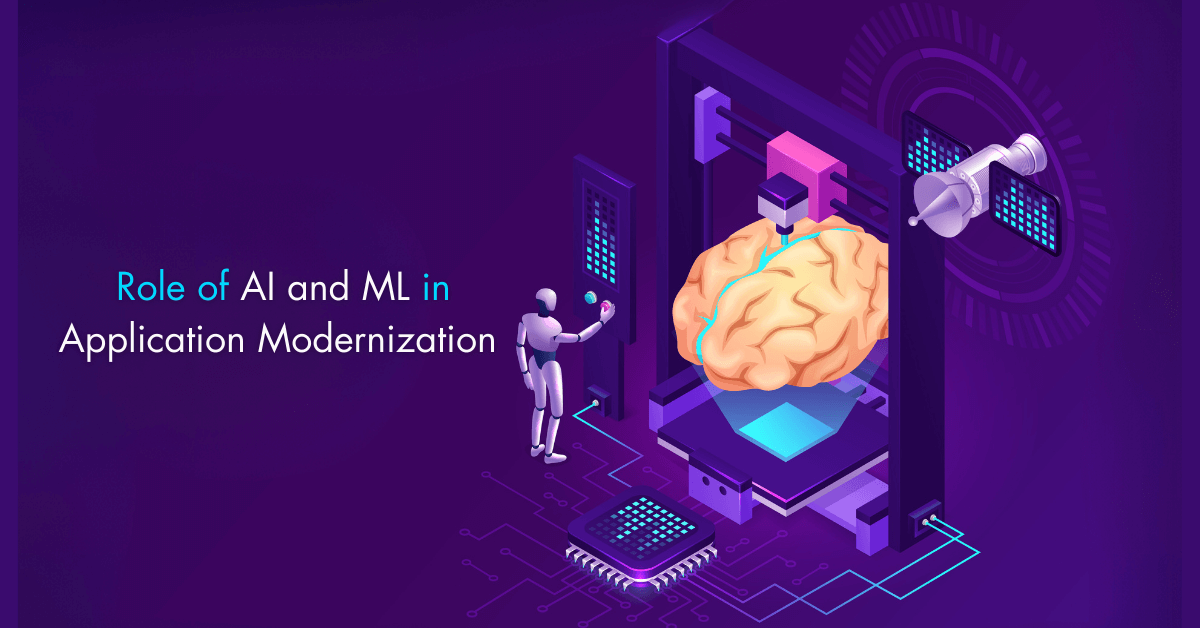App Modernization in the Digital Age: The Role of AI and ML in Application Modernization
In today’s fast-paced digital age, one way to achieve transformation in existing services is through app modernization, which involves updating or transforming existing apps to meet current industry standards and user demands. Artificial Intelligence (AI) and Machine Learning (ML) have been at the forefront of app modernization, helping businesses to streamline workflows, enhance user experience, and improve app security measures.
In this article, we will explore the role of AI and ML in application modernization and why businesses must embrace these technologies to remain competitive in the digital marketplace.
Understanding App Modernization in the Digital Age
Defining App Modernization
App modernization is the process of upgrading and improving the functionality and performance of existing mobile applications to meet the requirements of current business needs. This process includes making changes to the app architecture, features, design, and infrastructure to optimize performance, usability, and security.
The Importance of App Modernization in the Digital Age
In the digital age, mobile apps have become an integral part of our daily lives. Businesses that fail to keep up with the latest trends, technologies, and user demands risk losing customers and market share. That is why app modernization is crucial, as it enables businesses to improve their mobile app’s performance, user experience, and security, leading to increased user engagement and retention.
Also Read: Security and Compliance in Enterprise Applications
The Role of AI and ML in Application Modernization

Overview of AI and ML
Artificial Intelligence (AI) and Machine Learning (ML) are two interrelated technologies that enable computers to learn, analyze and make decisions based on data without explicit programming. AI and ML algorithms use statistical models to identify patterns in data and make predictions, classifications, and optimizations.
AI and ML are transforming the way applications are developed and optimized. They can be used in several areas, including natural language processing, image recognition, predictive analytics, and behavior tracking. AI and ML can help optimize app performance, improve user experience, and provide personalized recommendations to users.
How and Where AI and ML Used in Application Modernization
1. Natural Language Processing (NLP) for chatbots and voice assistants
Natural Language Processing (NLP) plays a critical role in the advancement of chatbots and voice assistants. Chatbots and voice assistants rely on AI technology to process and understand human language to provide accurate and helpful responses. With NLP, these AI-based systems can understand natural language, including idioms and colloquialisms, and respond appropriately. NLP has enabled chatbots and voice assistants to become more intuitive and user-friendly, creating an improved user experience. As this technology continues to develop, we can expect more personalized and conversational interactions with chatbots and voice assistants in the future.
2. Computer Vision for image and object recognition
Computer vision is a field of study that focuses on enabling computers to interpret and understand images and videos captured by cameras. One of the most common applications of computer vision is in image and object recognition, where computers are trained to identify and classify objects within images. This technology has a wide range of practical applications, from identifying individuals in security footage to recognizing products in a warehouse. Recent advances in machine learning and deep neural networks have improved the accuracy of these systems, making them an increasingly valuable tool in many different industries. As computer vision continues to develop, it has the potential to revolutionize the way we interact with and understand the visual world around us.
3. Predictive Analytics for personalized recommendations
Predictive analytics has revolutionized the way businesses make recommendations to their customers. Personalized recommendations have become a key feature in enabling businesses to provide a tailored experience to their customers. Predictive analytics makes personalized recommendations possible by analyzing vast amounts of data and identifying patterns in customer behavior. By utilizing machine learning algorithms, businesses can predict what products or services their customers are likely to be interested in and recommend them, resulting in increased customer engagement and loyalty. Overall, predictive analytics for personalized recommendations can benefit businesses by improving customer experience and increasing revenue.
4. Sentiment Analysis for social media monitoring
Sentiment analysis is crucial in monitoring social media platforms. It helps to gauge the mood, opinions, and reactions of users towards a particular topic or brand. It is a valuable tool that businesses use to understand how customers feel about their products or services. When combined with advanced analytical tools, it can be used to identify patterns and insights that can inform strategic decision-making. Sentiment analysis can thus help businesses and marketers not only track their brand reputation but also to predict and respond to customers’ needs. In summary, sentiment analysis plays a critical role in social media monitoring, providing businesses with actionable insights to improve customer engagement and satisfaction.
5. Anomaly Detection for fraud detection
Artificial Intelligence (AI) and Machine Learning (ML) are revolutionizing the way anomalies and frauds are detected in today’s digital world. With the sheer volume and complexity of data generated and processed by businesses, financial institutions, and governments, traditional methods of fraud detection are no longer sufficient. AI and ML have enabled enterprises to build intelligent systems that can learn from data, identify patterns, and predict potential anomalies. For instance, ML algorithms can quickly identify suspicious transactions by analyzing huge datasets and learning from past fraudulent activities, thereby providing real-time insights and alerts. As AI and ML capabilities continue to evolve, the accuracy, speed, and precision of fraud and anomaly detection will become more effective, boosting businesses’ operational and financial efficiencies, and reducing security risks.
Benefits of AI and ML in App Modernization
AL and ML have several benefits in app modernization. These technologies can help businesses automate repetitive tasks, optimize app performance, enhance the user experience, and provide real-time analytics. By using AL and ML, businesses can develop intelligent applications that can learn from data, drive insights, and provide personalized experiences.
1. Optimizing App Performance with AL and ML
AL and ML can help businesses optimize app performance by predicting, detecting, and resolving issues before they become critical. For example, ML algorithms can identify patterns in app usage, performance, and user behavior to optimize app performance, reduce latency, and minimize downtime.
2. Real-time Performance Monitoring through AL and ML
Real-time performance monitoring is another key benefit of AL and ML. These technologies can provide businesses with real-time insights into app usage, performance, and user behavior. By monitoring app performance in real-time, businesses can quickly identify issues, fix them, and enhance the overall user experience.
3. Improving Usability and Accessibility with AI and ML
AL and ML can also help businesses improve the accessibility and usability of the app. These technologies can analyze user behavior, language, and accessibility requirements to ensure the app is user-friendly for everyone. By improving accessibility and usability, businesses can reach a larger audience and provide an inclusive user experience.
4. Automating app maintenance with AI and ML
Keeping up with app maintenance and management can be a daunting task for businesses. With the help of AI and ML, app maintenance and management can be automated efficiently. By automating routine maintenance tasks, businesses can reduce human error and save time. AI and ML algorithms can identify businesses to take proactive action and prevent costly downtime.
5. Reducing downtime and enhancing availability
Downtime can have a significant impact on businesses, leading to lost revenue. decreased productivity, and brand damage. By utilizing AI and ML, businesses can reduce downtime and enhance application availability. AI and ML algorithms can enable businesses to identify performance issues and bottlenecks in real-time, allowing for immediate remediation. By reducing downtime, businesses can maintain customer satisfaction.
6. Improved User Experience
AI and ML can analyze user behavior and preferences, allowing developers to provide personalized recommendations, notifications, and content. This improves the user experience and increases user engagement, leading to improved retention rates and revenue.
7. Streamlined Workflows and Processes
AI and ML can automate repetitive tasks, such as data entry and analysis, freeing up time and resources for developers to focus on more complex tasks. This leads to faster development cycles and improved productivity.
8. Enhanced Security Measures
AI and ML can help identify and prevent security threats, such as malware and hacking attempts. They can also detect unusual patterns of user behavior and provide additional layers of authentication to ensure user data is kept safe.
Challenges in Adopting AI and ML in App Modernization
Limited Resources for Implementation
The adoption of AI and ML in app modernization requires specialized skills and resources, which can be expensive and time-consuming to acquire. Small businesses may find it challenging to implement these technologies due to limited resources.
Data Privacy and Security Concerns
The use of AI and ML requires large datasets, which can raise privacy and security concerns. Developers need to ensure that user data is stored and processed securely and that privacy regulations are adhered to.
Lack of AI and ML Knowledge and Expertise
AI and ML are complex technologies that require specialized knowledge and expertise. There is a shortage of skilled professionals in this field, making it challenging for businesses to hire the right talent to implement these technologies.
Successful Strategies for Implementing AI and ML in Application Modernization
Developing a Clear Plan and App Modernization Strategy
Before implementing AI and ML technologies into the application modernization process, it is essential to develop a clear plan and strategy. This plan should outline the goals and objectives of using these technologies and the specific use cases where they will be implemented. It is important to involve all stakeholders, including developers, designers, product managers, and data scientists, to ensure that everyone understands the plan and how it aligns with the overall business strategy.
Investing in Appropriate Platforms and Tools
To implement AI and ML in application modernization, it is crucial to invest in the appropriate platforms and tools. This includes selecting the right frameworks, libraries, and SDKs that support AI and ML functionalities. It is essential to evaluate the capabilities of these platforms and tools, as well as their integration and compatibility with existing systems, to ensure a smooth and successful implementation.
Collaborating Across Teams and Departments
AI and ML technologies require collaboration across teams and departments to be successful. This means working with data scientists and analysts to gather and analyze data, developers, and designers to create and implement models, and business leaders to align the technology with business objectives. To ensure effective collaboration, it is important to have transparent communication channels and clear roles and responsibilities.
Future of App Modernization with AI and ML
The future of AI and ML in application modernization is promising. According to experts, the global application modernization market is expected to reach USD 30.5 billion by 2030, growing at a CAGR of 14.7% from 2020 to 2027. The use of AI and ML can help businesses improve their application performance, reduce costs, and improve customer experience. It can also help organizations better understand their data and make data-driven decisions. With the increasing adoption of cloud computing and big data analytics, AI and ML will continue to play a crucial role in application modernization in the future.
New Innovations and Advancements in AI and ML
The future of app modernization is bright with the continuous advancements in AI and ML technologies. This includes natural language processing (NLP), computer vision, deep learning, and reinforcement learning. These innovations will enable developers to build more sophisticated and personalized mobile apps, leading to better user experiences, increased engagement, and higher customer satisfaction.
The Growing Importance of AI and ML in application modernization
AI and ML in application modernization will enable businesses to gain deeper insights into user behavior, improve decision-making, and automate processes to increase efficiency and agility. ML and AI in mobile apps have become the norm.
Case Studies: How AI and ML Transformed App Modernization
Case Study 1: Improving User Experience with AI and ML
One example of AI and ML transforming app modernization is the use of chatbots and virtual assistants. These technologies leverage NLP and machine learning to understand user intentions and provide personalized responses, improving the user experience. For example, the H&M chatbot uses AI to recommend outfits based on user preferences and purchase history, increasing engagement and sales.
Case Study 2: Streamlining Workflows and Processes with AI and ML
Another example is the use of predictive analytics to streamline workflows and processes. For example, the UPS mobile app uses ML algorithms to optimize routing and delivery times, resulting in faster and more efficient deliveries. This technology also enables UPS to proactively identify and resolve delivery issues before they occur, increasing customer satisfaction.
Best Practices for App Modernization in the Digital Age
Keeping Up with the Latest Industry Trends and Advancements
To stay competitive in the digital age, it is important to keep up with the latest industry trends and advancements. This includes attending conferences, networking with peers, and participating in industry forums. By staying up-to-date, businesses can identify new opportunities and leverage the latest technologies to improve their products and services.
Partnering with the Right Experts and Service Providers
App modernization with AI and ML requires expertise and experience. To ensure successful implementation, businesses should partner with the right service providers and experts who have a deep understanding of these technologies and their applications. This will enable businesses to leverage these technologies to their full potential, providing a competitive advantage in the digital marketplace.
How does OTS Solutions help you in Application Modernization?
OTS Solutions is a leading technology solutions provider that specializes in app modernization. With our expertise in AI/ML solutions, firms can transform their outdated and inefficient apps into modern, user-friendly platforms that increase productivity, reduce costs, and improve customer experience. OTS Solutions uses innovative technologies to analyze, redesign and migrate applications to cloud platforms, eliminating the need for costly hardware and software maintenance. We also provide ongoing support and maintenance to ensure that the modernized apps are always up-to-date and optimized to meet the ever-changing needs of the business. With OTS Solutions’ app modernization services, firms can stay competitive in the digital age and provide their customers with a seamless, modern digital experience.
Also Read: App Modernization Guide for Business Transformation
Conclusion:
In conclusion, app modernization and the integration of AI and ML technologies is important for businesses looking to stay ahead of the competition. By taking advantage of these innovations, businesses can improve their app’s user experience, streamline workflows, and enhance security measures. Businesses must keep up with the rapidly evolving landscape of app modernization and explore the potential of AI and ML to create robust, efficient apps that meet the changing needs of customers.
Maximize Your Application Modernization with AI and ML
Discover how AI and ML can enhance your application modernization efforts. Our experienced professionals will assess your needs and provide tailored recommendations for your business.
Frequently Asked Questions:
1. What is application modernization for digital transformation?
Application modernization for digital transformation refers to the process of updating and upgrading existing software applications to keep pace with rapidly changing digital environments and business requirements. The primary goal of this process is to enhance the performance, security, scalability, and agility of applications and make them more compatible with modern technologies and platforms.
2. What is an example of application modernization?
Some examples of application modernization:
- Leveraging microservices
- Improving automation
3. Why is AI & ML necessary in today’s world?
The world today is loaded with data, information, and technological advancements. This need to be processed, analyzed, and interpreted in a way that humans alone cannot achieve. AI & ML are therefore necessary in today’s world as they provide exceptional solutions for managing and processing data, enabling individuals and organizations to have valuable insights, predictions, and outcomes.
4. How are AI and machine learning being used to test mobile applications?
The world today is loaded with data, information, and technological advancements that need to be processed, analyzed, and interpreted in a way that humans alone cannot achieve. Artificial Intelligence (AI) and Machine Learning (ML) are therefore necessary in today’s world as they provide exceptional solutions for managing and processing data, enabling individuals and organizations to have valuable insights, predictions, and outcomes.
5. How are AI and ML changing the technology landscape?
AI and ML are revolutionizing technology by transforming the way we interact with machines and process data. With AI, machines can learn to make decisions based on historical data; while ML algorithms. These algos help computers to recognize patterns, structures, and cluster the related data for improved analysis. AI and ML are now at the core of many technological advances, automating tasks that traditionally were left for humans.
Related Blog:








